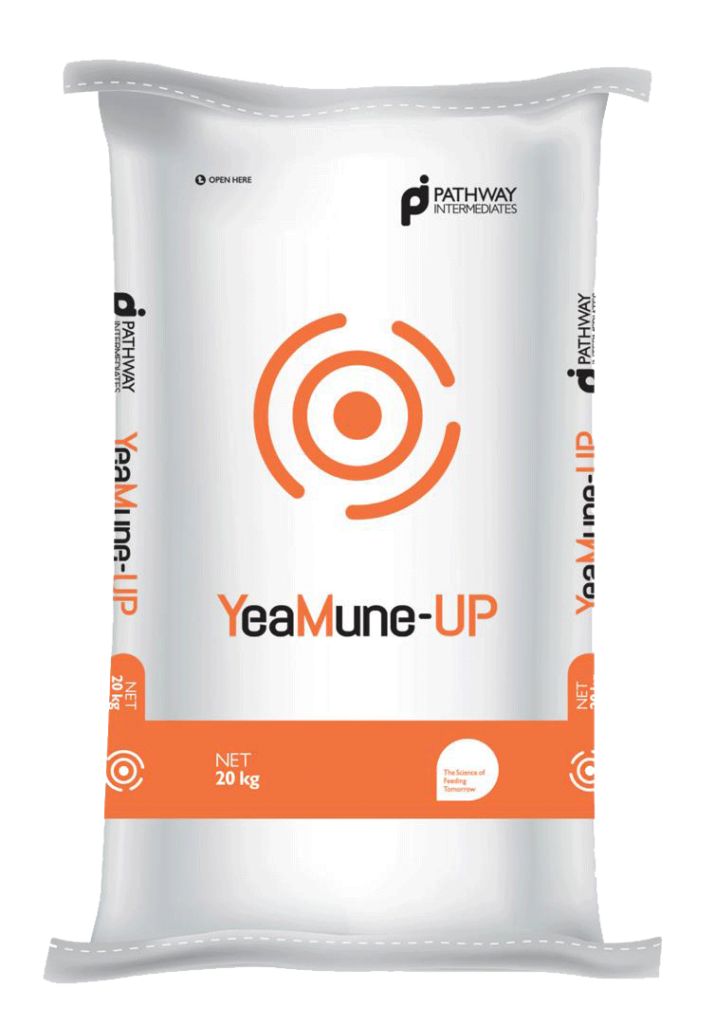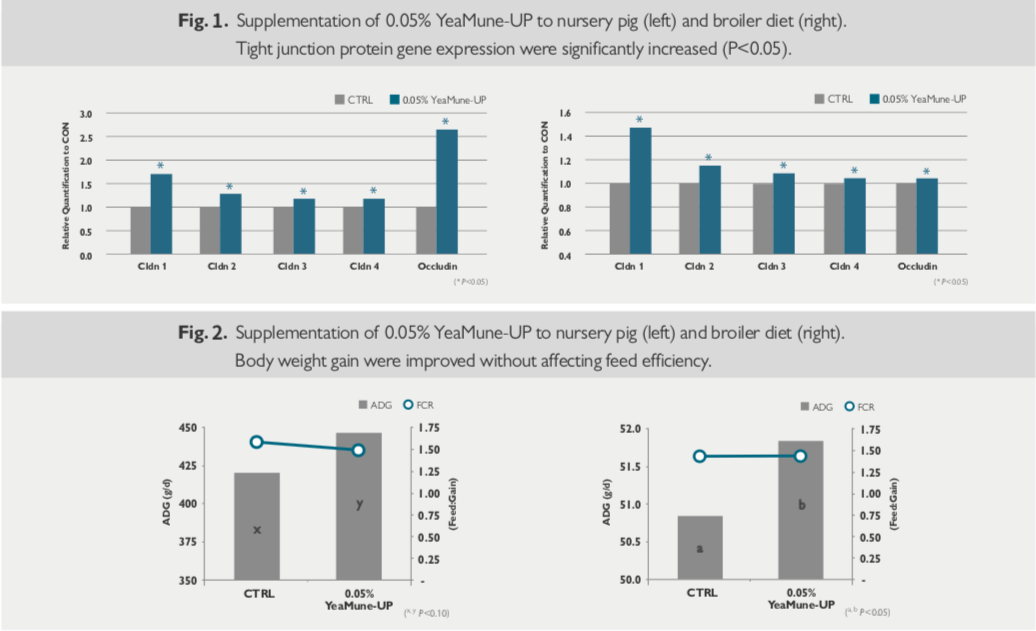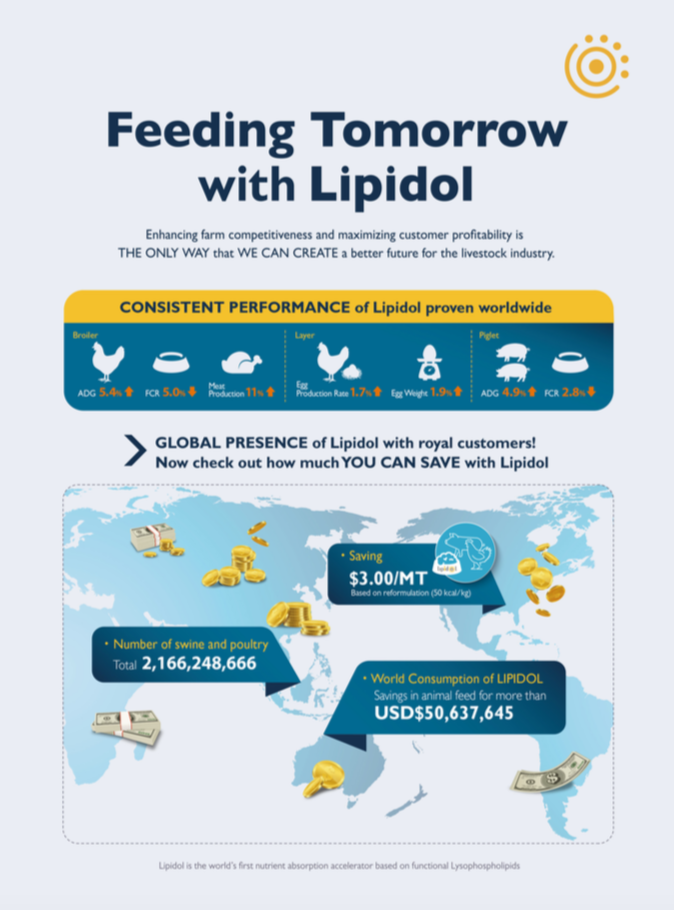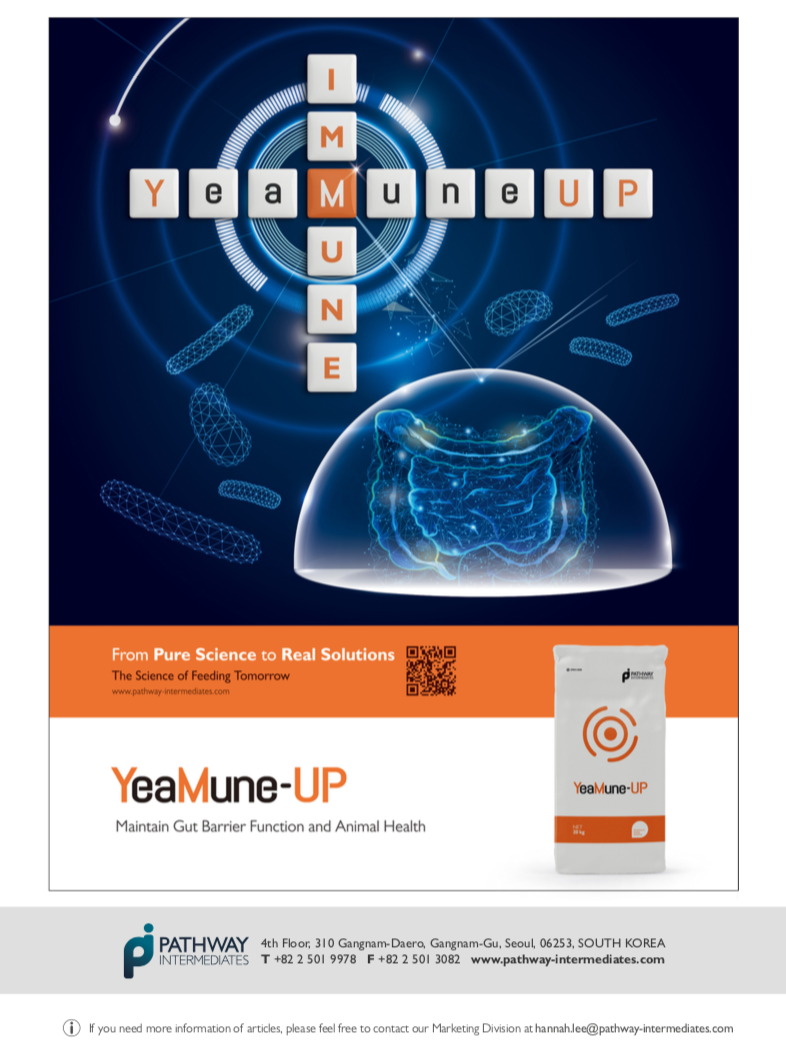
‘YeaMune-UP’ which supports
a Healthy Immune System in Europe
Pathway Intermediates Limited (United Kingdom) has officially launched a feed additive product, YeaMune-UP, in Europe. Europe is the world’s leading livestock industry country, producing the world’s highest quality livestock food based on its population of 7.5 billion and advanced livestock technologies. Pathway Intermediates entered the European market earlier with Lipidol (The First Absorption Accelerator) and has accelerated its expansion by continuing to secure global talent.
Pathway Intermediates also recently obtained sales approval for YeaMune-UP, which Supports a Healthy Immune System, to contribute to a sustainable animal industry and the healthy growth of animals in Europe and officially launched it in the European market this month.
YeaMune-UP is produced with Saccharomyces boulardii, a unique yeast strain, which was isolated for the first time by French scientist Henry Boulard after identifying its role in controlling cholera whilst on a trip to Southeast Asia. Pathway Intermediates uses the same strain and uses it to help support and maintain a healthy immune system in animals. YeaMune-UP is a highly effective functional product rich in β-glucan, mannan-oligosaccharides (MOS) and abundant nutrients. Yeast is inactivated during manufacturing process to ensure stability, safety and efficacy.
Pathway Intermediates has already received a great response from customers by selling and exporting YeaMune-UP to South Korea and Asia, the Americas, and the Middle East regions. Pathway Intermediates plans to continue expanding its business across Europe with the launch of YeaMune-UP in the
European market.
Pathway Intermediates will strive to provide optimal and reliable solutions for each and every client around the globe. standards and policies in various fields such as environmental protection, social contribution, and governance. Pathway Intermediates promises to continue its efforts for the development of the sustainable animal industry

The ideal yeast cell wall
product for young animals
Published in All About Feed – Young Animal Feed Special ( June 2021) By Dr. Hanbae Lee, Marketing Manager, Pathway Intermediates
It is very tempting to turn the page when we come across with the words “yeast”, “β-glucan” or “MOS”. Surely, we already know how it can benefit young animals and have experiences with these functional polysaccharides. Then what more to talk about?
Saccharomyces cerevisiae var. boulardii
In 1920, a French microbiologist by the name of Henri Boulard was traveling through Southeast Asia in search of a heat-stable yeast that was suitable for wine production. A cholera outbreak occurred and he learned that locals would chew or make tea from the skins of lychee and mongosteen to fight diarrhea as traditional remedy. Later, he was able to isolate a new strain of yeast from these tropical fruits. In 1923, Saccharomyces cerevisiae var. boulardii was introduced to the world. Over the years, S. boulardii has been extensively studied and well characterized. Although S. boulardii is >99% identical to the general S. cerevisiae at genomic level, it shows clear differences in terms of optimal growth temperature (37°C vs. 30°C) and acid resistance (pH 2.0 vs. 6.0) making S. boulardii a great candidate as a probiotic. Further studies reported anti-toxin, anti-microbial, anti-inflammatory, immuno-modulatory effect of S. boulardii. Today, S. boulardii supplements can be easily found in pharmacies and general stores as one of the most acclaimed probiotic for digestive disorders such as IBS, IBD and diarrheal problems.
S. boulardii as yeast cell wall product
S. boulardii as yeast cell wall product is an effective probiotic for livestock as much as it is for human application. Given natural ability to survive and grow in the gastrointestinal tract has led its development as probiotic feed additive. While there are many pros with this probiotic approach, there is one obvious con. When using a live yeast product, one cannot fully expect its immuno-modulatory effect. Again, it is the branched β-1,3-1,6-glucan inner layer of yeast cell wall that is recognized by pattern recognition receptors (PRRs) of macrophages, stimulating phagocytosis, immunoglobulin secretion and enhancing its antigen presentation abilities. The inner layer of yeast cell wall need to be exposed to show boosting effect on host immune system.
It has been reported that S. boulardii has a thicker inner cell wall resulting in enriched β-1,3-1,6-glucan content compared to general S. cerevisiae. Also, the molecular pattern of its functional polysaccharides is more complex allowing improved immuno-modulatory and anti-microbial abilities. This implies that potential of S. boulardii as yeast cell wall product is quite promising
Practical limitations
While S. boulardii has successfully positioned itself in the probiotic world, it has been neglected in other markets. This is because S. boulardii produce less alcohol and nucleotide compared to their professional S. cerevisiae cousins. As yeast cell wall is basically by-product from
cosmetic, flavoring, and biofuel industries, it seems rather difficult to find a yeast cell wall by-product made from S. boulardii. Even if we were to discover such product, special attention is needed regarding extraction method as it will greatly affect quality as feed additive. Breaking open yeast cell wall is achieved by autolysis or hydrolysis which is primarily used to obtain yeast extract and inactivate yeast. Hydrolysis using exogenous protease is favored by the industry as it simply can cut through yeast cell wall more efficiently. However, the outer layer of yeast cell wall is also damaged during the process, resulting in significant loss of MOS. Just thinking about the quality as feed additive, autolysis will result in yeast cell wall with higher anti-microbial property. Collectively, a S. boulardii yeast cell wall product manufactured through autolysis process would be ideal for young animal applications, but seem extremely difficult to find, if such product exist at all.
The Ideal yeast cell wall product
Pathway Intermediates is a research driven company dedicated solely to animal nutrition. With more than 30 years of fermentation expertise, Pathway Intermediates manufactures one-of-a-kind yeast cell wall product (YeaMune-UP) through autolysis process with patented strain of S. boulardii. Surprisingly, nothing is extracted from the yeast during the whole manufacturing process, making YeaMune-UP unique as it cannot be considered a by-product nor co-product.
Recent trials with nursery pigs and broilers clearly demonstrated its efficacy in gut health and performance improvement (figure 1 and 2). In both trials, YeaMune-UP supplementation significantly increased tight junction protein gene expression (claudin family, occludin). Consequently, due to better gut health as indicated by tight junction protein status, body weight gain was improved by 3.8% and 2.0% for nursery pigs and broilers, respectively, without affecting feed efficiency.
Young animal are immature and fragile, requiring special attention both nutritionally and immunologically. After so many years, we still benefit from yeast cell wall supplements for young animals, but there is room for improvement. The future is exciting for S. boulardii yeast cell wall product manufactured through autolysis process.

Pathway Intermediates hosts
‘Nutrition Program During Uncertain Events’ webinar with success

Pathway Intermediates held a webinar titled ‘Nutrition Program During Uncertain Events’ for South Korean feed corporations in May 2021. This webinar was designed to facilitate in-depth discussion of nutrition programs to assist with the increasing burden in the South Korean animal industry as major feed grain prices continue to soar. More than 100 animal industry specialists attended the webinar held on May 27th. As a guest speaker, Professor Sungwoo Kim (North Carolina State University, USA), gave a lecture on the difficulties of the animal feed industry and the latest strategies against those difficulties, and shared practical methods and know-how that could be applied in South Korea regarding the soaring prices of feed ingredients during a Q&A session. Dr. Hanbae Lee from Pathway Intermediates (Marketing Manager) said, “At a time when overseas business trips are difficult, we are glad to invite Professor Sungwoo Kim, a world-renowned swine nutritionist, to discuss ways for the South Korean animal industry to overcome the current difficulties.” He added, “In addition to what we discussed in this webinar, Pathway Intermediates plans to contribute to clients successfully responding to the high feed grain prices through Endo-Power (Powerful Digestion Accelerator) and Lipidol (The First Absorption Accelerator). Pathway Intermediates will continue to share values and knowledge with customers by hosting a variety of events.


